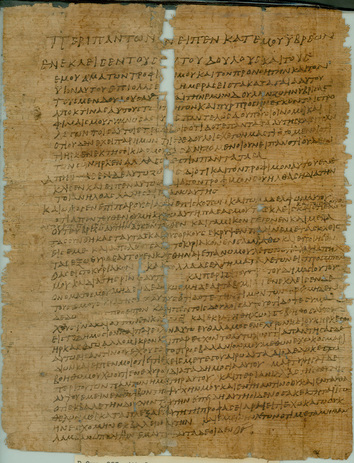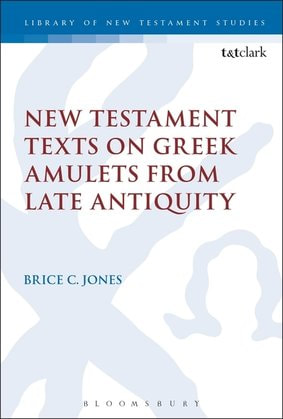|
P.Oxy. 6.903 is a fourth century papyrus that was discovered in 1897 in the ancient Egyptian city of Oxyrhynchus. It is complete and generally well-preserved (image below). The papyrus is an affidavit comprised of a complaint from a Christian woman against her husband, who is charged with verbally and physically abusing her, their slaves, and foster children. Apparently, the husband suspected that the wife and the slaves were stealing from him. And so, he locks them up and violently abuses them. The wife is therefore turning to the state for protection. The papyrus is historically interesting for several reasons. For one, it documents a Christian woman going to church on the Sabbath (ἀπελθοῦσα [εἰ]ς τὸ κυριακὸν ἐν σαμβάθῳ). This is interesting because we learn from many early Christian authors that Christians no longer observed the Sabbath (e.g., Ignatius, Mag. 9; Tertullian Idol. 14). The papyrus also documents a clear case of violence against slaves. The text states that the husband “insulted his slaves and my [the wife’s] slave Zoe and half killed them with blows, and he applied fire to my foster-daughters.” We learn from other ancient sources that slaves often suffered extreme violence at the hands of their slave owners, so we should take this description at face value. Notice that both the husband and the wife owned slaves, which suggests they were wealthy. Another interesting feature of the text is that some local bishops served as reconcilers: “he [i.e., the husband] swore in the presence of the bishops” (ὤμοσεν ἐπὶ παρουσίᾳ τῶν ἐπισκόπων). This demonstrates that the clergy were appealed to in the first instance, and that the wife was forced to turn to the state only after the church proved ineffective in settling the dispute. This raises many questions concerning the authoritative boundaries of Christian clergy in domestic affairs. Overall, this is a fascinating papyrus that gives a glimpse into the realities of domestic life, spousal abuse, and the role of Christian clergy. More importantly, it provides good evidence that women could and did make use of the Roman legal system to protect themselves against violence from their husbands. Here is an English translation of the text (Greek text here) along with an image of the papyrus:  "Concerning all the insults uttered by him against me. He shut up his own slaves and mine with my foster-daughters and his agent and son for seven whole days in his cellars, having insulted his slaves and my slave Zoe and half killed them with blows, and he applied fire to my foster-daughters, having stripped them quite naked, which is contrary to the laws. He also said to the same foster-daughters, 'Give up all that is hers,' and they said, 'She has nothing with us'; and to the slaves when they were being beaten he said, 'What did she take from my house?' And they under torture said, 'She has taken nothing of yours, but all your property is safe.' Zoilus went to see him because he had shut up his foster-son, and he said to him, 'Have you come on account of your foster-son or of such a woman, to talk about her?' He swore in the presence of the bishops and of his own brothers, 'Henceforward I will not hide all my keys from her [he trusted his slaves but would not trust me]; I will stop and not insult her.' Whereupon a marriage deed was made, and after his agreement and his oaths, he again hid the keys from me; and when I had gone out to the church on the Sabbath he had the outside doors shut on me, saying 'Why did you go to the church?' and using many terms of abuse to my face, and through his nose. There were 100 artabae of corn due to the State on my account of which he paid nothing, not a single artaba. He obtained possession of the books, and shut them up saying, 'Pay the price of the hundred artabae,' having himself paid nothing, as I stated before; and he said to his slaves, 'Provide helpers, to shut her up also.' Choous his assistant was carried off to prison, and Euthalamus gave security for him which was insufficient, so I took a little more and gave it for the said Choous. When I met him at Antinoopolis having my bathing-bag [?] with my ornaments, he said to me, 'I shall take anything you have with you on account of the security which you gave to my assistant Choous for his dues to the State.' To all this his mother will bear witness. He also persisted in vexing my soul about his slave Anilla, both at Antinoopolis and here, saying, 'Send away this slave, for she knows how much she has possessed herself of,' probably wanting to get me involved, and on this pretext to take away whatever I have myself. But I refused to send her away, and he kept saying, 'A month hence I will take a mistress.' God knows this is true."
1 Comment
Suburbanbanshee
4/20/2015 09:47:38 am
Well, I don't know Greek so I have no idea if the expression supports it, but you could go to church any day of the week, and I think by this time they had daily Mass as well as daily Divine Office celebrated in churches. (Insert proper terminology for Egypt.) She could also have been going to church for private prayer, to meet up with friends, or even to do errands (although again, I don't know if this was a thing in Egypt or at that time).
Reply
Your comment will be posted after it is approved.
Leave a Reply. |

Available at Amazon!
Archives
June 2020
Categories
All
|